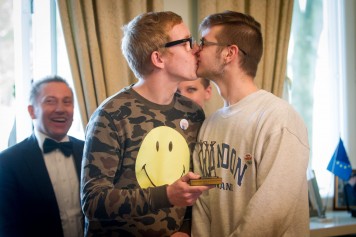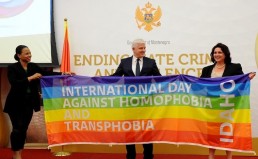Rescuing the drowning is the responsibility of the drowning themselves; there is no place for gays, lesbians, transsexuals and other similar people in Lithuanian society. Such were the dominant views expressed after the District Court of Klaipėda reached an official decision regarding the photo of two boys kissing that was posted on Facebook. However, it seems that attempts to rescue one’s self or find a place in society are not only necessary, but sometimes even successful, and usher in positive results.
We’ll begin with the pleasant news. At the Rainbow Days 2015 reception hosted at the Finnish Embassy, activists Pijus Beizaras and Mangirdas Levickas were presented with an award to honor their courage in defending their rights and those of the gay community. The less than pleasant news is that the young men recently appealed to the European Court of Human Rights in Strasbourg, alleging that the measures in Lithuania for combatting hate online are insufficient.
Neither this appeal nor the award would have existed were it not for an upsetting story that began last December in Kaunas. It was then that the two students uploaded a photo of themselves kissing to Facebook. Although their faces were not visible, it was clear that the subjects were both male. The kiss was neither a polite greeting nor an instance of drunken foolishness at a party. It was a true kiss between two loving people. That’s it. There were no pornographic elements, which some Lithuanians seem to see everywhere as soon as the word ‘tolerance’ is uttered (I’m not exaggerating; I’ve heard stories with my own ears in which some people equate ‘tolerance’ with ‘homosexuality.’). With this photo, the young men merely sought to publicly announce their feelings.
The photo attracted a great deal of attention. Thousands ‘liked’ it and comments from both friends and strangers poured in (the photo was public). In addition to greetings and support for their courage, the couple also received hateful, abusive and aggressive messages. While some limited themselves to ironic condolences equivalent to showing them the middle finger, others explicitly called them “hicks,” claiming that “these types should be castrated and burned alive.”
The national LGBT* rights organization LGL urged the General Prosecutor’s Office to pay attention to this outbreak of hatred. They responded by forwarding a statement to the city’s prosecutors, who refused to launch an investigation. Apparently, the offenders “used the wrong words to express their disapproval of homosexual relationships, but obscene words alone do not warrant criminal liability” and do not constitute incitement against homosexuals. The prosecutors evaluated the written comments of 29 people individually, rather than as a whole. But suppose that those 29 people know each other and conspired to attack the guy…Of course, it is unlikely that they have banded together to form a rogue gang, but these individual attacks snowball and give these young people the impression that in Lithuania, they are surrounded by nothing but hate.
After the court’s decisions, it is clear that the public degradation of others, not because of their behavior or speech, but because of how they were born, does not incur criminal liability; here, you can use the commentators’ dictionary—if you make fun of homosexuals by calling them invalids, would you similarly insult someone lacking arms or sight? I’m not a lawyer. I don’t want to argue. But, in the Criminal Code it is written: “A person who publicly incites violence or the physical[ly] violent treatment of a group of persons or a person belonging thereto on grounds of […] sexual orientation […] shall be punished by a fine or by restriction of liberty or by arrest or by imprisonment for a term of up to three years.”
I am more interested in the grounds for the decisions reached by the prosecutor and courts. We can forget the photo and think about any snapshot from our own lives that we have posted to social media to which people may react similarly. Or think of a comment, written intentionally or unintentionally online.
One cannot force concern upon the prosecutor; he admitted that “the wrong words were used,” even if they did not incite others to violence against homosexuals. But let’s say that I was so upset by his decision that I wrote a comment suggesting that the prosecutor should be ended (this is just an expression of my anger)? In the end, do words only qualify as incitement if they are detailed, explicit instructions? If one person writes, “throw them on the fire,” and another “castrate them,” and yet a third “smash their heads in,” a citizen without a sense of humor could take these words literally and thereafter take action.
Attention! This is the most interesting part. The District Court of Klaipėda noted that the couple shared the photo not just with their Facebook friends but publicly, thereby making it visible to strangers, so the boys should have expected such reactions. According to the court, “[the photo] can be seen as intending to deliberately provoke or shock people with different beliefs, or to encourage the publishing of negative comments.” This is the exact same type of logic behind statements blaming a girl who has been raped for wearing a short skirt and a low-cut blouse, as such apparel fills men with uncontrollable passion. Of course she’s guilty. Isn’t the goal of a sexy outfit to arouse others? But an outfit does not qualify as permission to force a girl into bed.
Before flying to Afghanistan, an Afghan man living in Lithuania taught me how to dress decently. To tease him a little bit, I turned to discussing clothing that covers women’s entire bodies. “Just imagine if you were surrounded by a bunch of half-naked women. How should we as men feel?,” the man agitatedly responded. So women, homosexuals, and other vulnerable members of society must first think about the strong majority, so as not to cause them any discomfort.
The students “HAD AND OUGHT TO (emphasis mine) anticipate that their eccentric behavior would contribute neither to mutual understanding with people in society holding different views nor to the cultivation of tolerance.” Representatives of sexual minorities must be kept locked up at home while society learns tolerance, and only then may they be released (just like people with disabilities during the Soviet era—remember how unusual they seemed in public during the first year of independence?). In Lithuania, it is indeed unadvisable to show your feelings for a member of the same sex, but their photo was decent and aesthetically pleasing.
A person publishing information about one’s self on social media “may use the freedom of expression to foster tolerance, but must take into account that this freedom is inextricably linked to the responsibility to respect the believes and traditions of others.” The District Court agreed, stating that “Lithuania promotes and protects the traditional family values which are enshrined and protected by the Constitution of the Republic of Lithuania.”
It turns out that MY duty is to make sure that other people feel comfortable and don’t get offended, even if I don’t fit neatly into the standard frame. Loudly crying babies greatly disturb me—perhaps their mothers could sit with them at home until they learn to behave in a cultured manner? Someone is probably bothered by seeing people with disabilities—should they too be banned from showing themselves in public? One must respect the constitution (and all people), but does it not promise equal rights for all? Of course, people must think about the types of things they choose to post on social media. Some parents don’t feel that it’s excessive to post a lot of photos of their children; I wouldn’t want to be in their children’s shoes, but that’s it. But how do women who can’t have children feel? Is it not necessary to take their feelings into consideration?
And let’s say that I take a photo of myself posing as Mother Mary and share it on Facebook. Nothing ugly, but surely believers would get the opportunity to get angry and say that I should be thrown on the fire along with the kissers. You may recall that the recent ad campaign for designer Robertas Kalinkinas received a similar reaction.
“Unfortunately [in our country], people lack an understanding of what it means to be a legal democratic state; the meaning of societal pluralism; that the rule of law of a democratic state is not just a privilege of the the majority, but must be implemented and protected for minorities as well; that the Constitution contains anti-majority legislation, providing legal measures to defend the rights and interests of those who don’t belong to the majority…,” commented lawyer Vytautas Mizaras in response to the writings concerning this trial. “If we ruled merely according to the will of the majority, we wouldn’t need rights—we’d just ask the majority (ex. with a sampling of 100 people, as in the case of R. Kalinkinas), and just accept decisions based on the thoughts and desires of the real or fake majority. We just don’t want to accept that in a democratic state, public moral justice is not measured and evaluated according to the opinion of the majority.”
The story behind one picture is an ideal opportunity for lawyers to determine how images and videos published on Facebook should be treated. It seems that it is unacceptable not only to promote violence (at least that’s what is written in the law), but also to celebrate joy, because in doing so, we may hurt the sensitive souls of Lithuanians.
Eglė Digrytė
 This article was prepared as a part of the project “Consolidating Sustainable Development of National Equality and Diversity Forum (NEDF)” which is supported by the NGO Programme Lithuania funded by EEA Grants.
This article was prepared as a part of the project “Consolidating Sustainable Development of National Equality and Diversity Forum (NEDF)” which is supported by the NGO Programme Lithuania funded by EEA Grants.




